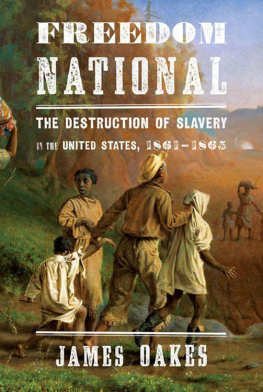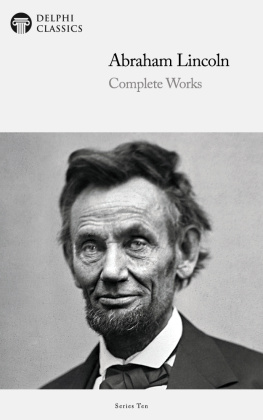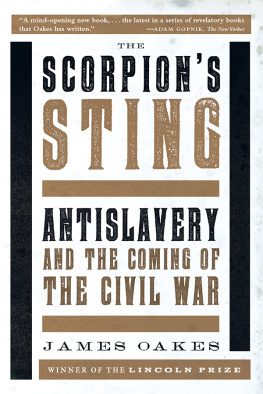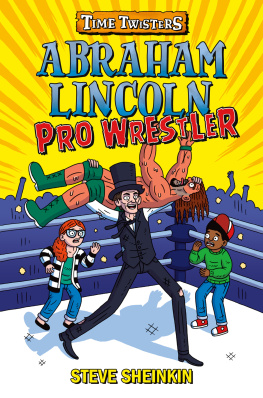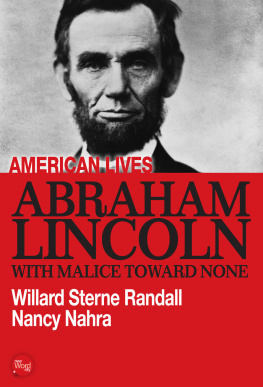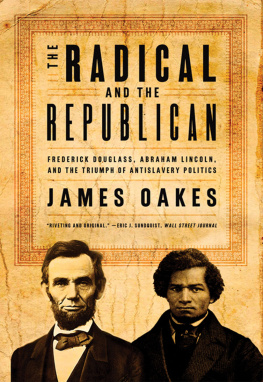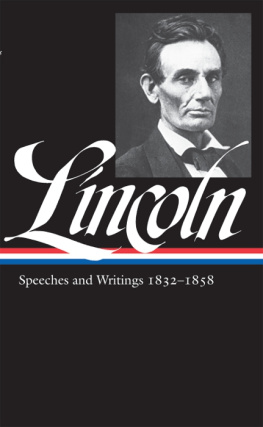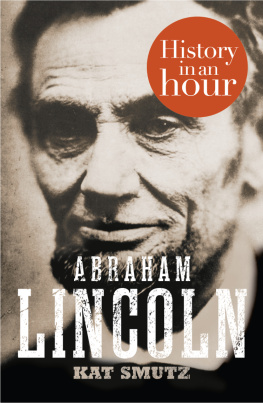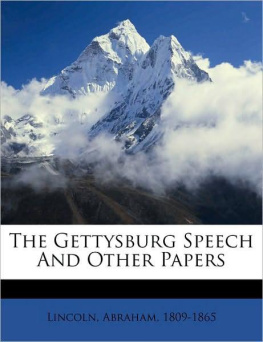James Oakes - The Crooked Path to Abolition: Abraham Lincoln and the Antislavery Constitution
Here you can read online James Oakes - The Crooked Path to Abolition: Abraham Lincoln and the Antislavery Constitution full text of the book (entire story) in english for free. Download pdf and epub, get meaning, cover and reviews about this ebook. year: 2020, publisher: W. W. Norton & Company, genre: Romance novel. Description of the work, (preface) as well as reviews are available. Best literature library LitArk.com created for fans of good reading and offers a wide selection of genres:
Romance novel
Science fiction
Adventure
Detective
Science
History
Home and family
Prose
Art
Politics
Computer
Non-fiction
Religion
Business
Children
Humor
Choose a favorite category and find really read worthwhile books. Enjoy immersion in the world of imagination, feel the emotions of the characters or learn something new for yourself, make an fascinating discovery.

- Book:The Crooked Path to Abolition: Abraham Lincoln and the Antislavery Constitution
- Author:
- Publisher:W. W. Norton & Company
- Genre:
- Year:2020
- Rating:3 / 5
- Favourites:Add to favourites
- Your mark:
- 60
- 1
- 2
- 3
- 4
- 5
The Crooked Path to Abolition: Abraham Lincoln and the Antislavery Constitution: summary, description and annotation
We offer to read an annotation, description, summary or preface (depends on what the author of the book "The Crooked Path to Abolition: Abraham Lincoln and the Antislavery Constitution" wrote himself). If you haven't found the necessary information about the book — write in the comments, we will try to find it.
James Oakes: author's other books
Who wrote The Crooked Path to Abolition: Abraham Lincoln and the Antislavery Constitution? Find out the surname, the name of the author of the book and a list of all author's works by series.
The Crooked Path to Abolition: Abraham Lincoln and the Antislavery Constitution — read online for free the complete book (whole text) full work
Below is the text of the book, divided by pages. System saving the place of the last page read, allows you to conveniently read the book "The Crooked Path to Abolition: Abraham Lincoln and the Antislavery Constitution" online for free, without having to search again every time where you left off. Put a bookmark, and you can go to the page where you finished reading at any time.
Font size:
Interval:
Bookmark:
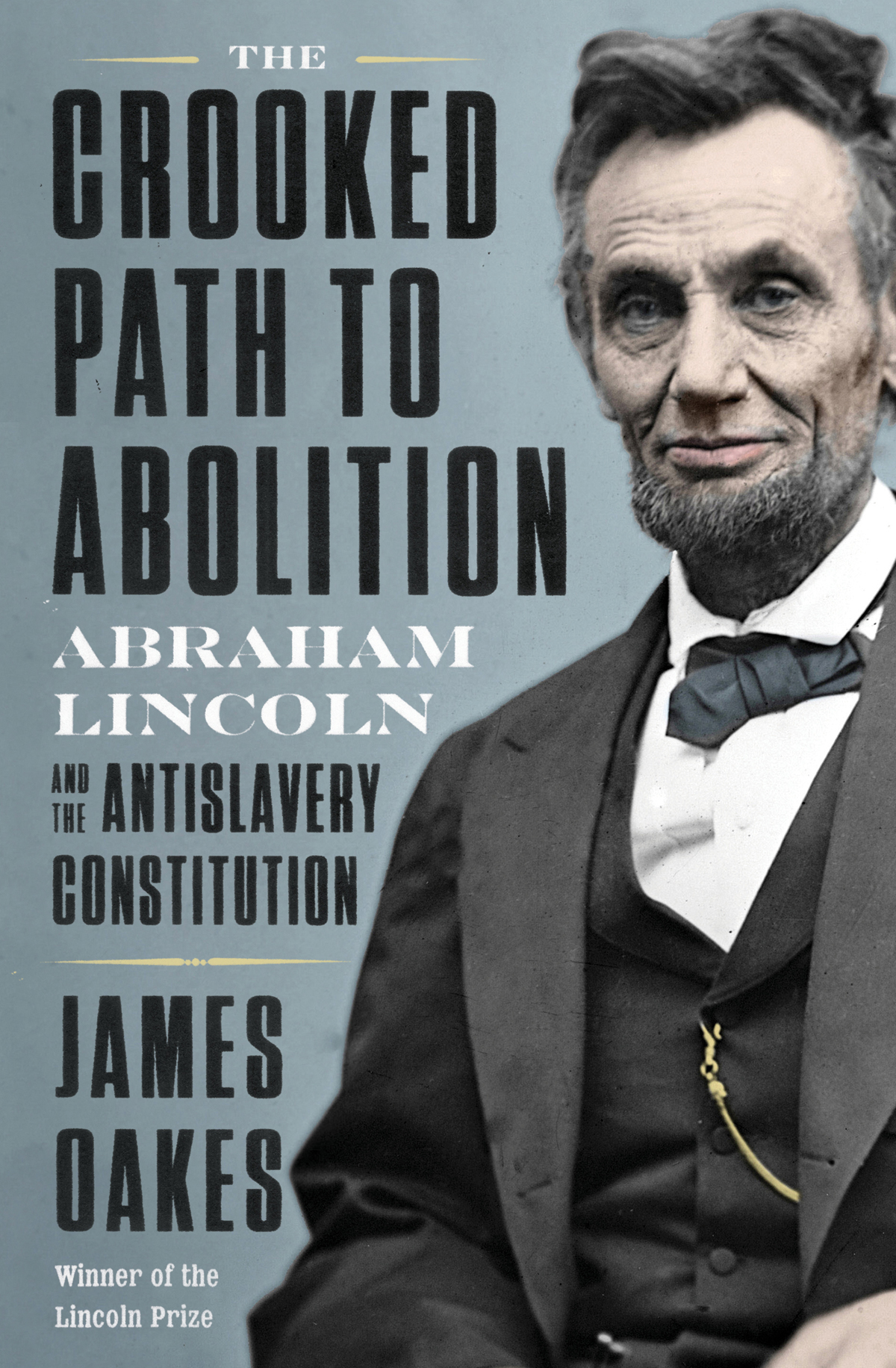
T HE C ROOKED P ATH TO A BOLITION

Abraham Lincoln and the Antislavery Constitution
JAMES OAKES

To my students, with gratitude and admiration
Contents
I N EARLY 1861, on his long, meandering journey from Springfield, Illinois, to Washington, DC, president-elect Abraham Lincoln stopped in Philadelphia on February 21 and gave a couple of brief but revealing speeches. By then six slave states had seceded from the Uniona Union Lincoln was determined to hold together. At Independence Hall, inspired by the place where his country had been founded, Lincoln could listen to those breathings rising within the consecrated walls where the Constitution of the United States, and, I will add, the Declaration of American Independence was originally framed. Lincoln believed that, taken together, these two documentsthe Declaration and the Constitutionstated plainly the bedrock principles of the American nation. In one of those biblical allusions at which he was so adept, Lincoln swore an oath: May my right hand forget its cunning and my tongue cleave to the roof of my mouth, if ever I prove false to those teachings.
It was not mere separation from Great Britain that had inspired the revolutionary generation, Lincoln told his listeners that day in Philadelphia. They were aiming for something higher, something in that Declaration giving liberty, not alone to the people of this country, but hope to the world for all future time. It was that which gave promise that in due time the weights should be lifted from the shoulders of all men, and that all should have an equal chance. This, Lincoln declared, is the sentiment embodied in the Declaration of Independence. Now, as he faced the dismemberment of the Union, he wondered, can this country be saved upon that basis? If so, I will consider myself one of the happiest men in the world. But what if the Union could only be preserved if Americans reneged on the promise of equality bequeathed by the founders? Standing in Independence Hall the soon-to-be president of the United States made one of the most startling statements of his career. If this country cannot be saved without giving up that principle, Lincoln declared, I would rather be assassinated on this spot.
As unflinching as it was, Lincolns firm commitment to fundamental human equality did not make him an abolitionist. He never called for the immediate emancipation of the slaves, the way most abolitionists did. He never denounced slaveholders as sinners and never endorsed the civil or political equality of Blacks and whites. He never claimed, as some abolitionists did, that the Constitution empowered Congress to abolish slavery in the states, nor did he agree with other abolitionists that the Constitution was a proslavery document. He never opened his home to fugitive slaves on the underground railroad. He endorsed the voluntary colonization of free Blacks long after most abolitionists had repudiated colonization outright. He never joined an abolitionist society, but he did join the Springfield branch of the American Colonization Society. He certainly spoke at colonization meetings and temperance meetings, but never at an abolitionist meeting. Lincoln supported due process rights for fugitive slaves, but he never endorsed outright defiance of the Fugitive Slave Act of 1850 and never denounced it as unconstitutional. Where abolitionists often publicized slaverys most gruesome featuresthe whippings, the sexual abuse, the brutal destruction of slave familiesLincoln rarely referred to such things. He was repelled by what he saw as the stridency of so much abolitionist rhetoric. As Eric Foner has said, Abraham Lincoln was not an abolitionist and never claimed to be.
But Lincoln always hated slavery as much, he once said, as any abolitionist. Like the abolitionists, Lincoln openly attacked slavery as a social, political, and moral evil. If there were differences between antislavery radicals and antislavery politicians like Lincoln, there were also substantial overlaps between them. Most abolitionists understood that in the end the problem of slavery required a political solution, and so they quite often framed their arguments in careful legal and constitutional termsterms they generally shared with antislavery politicians. Like Lincoln and the Republicans, abolitionists considered themselves the heirs of the founders, the generation that had set in motion the abolition of slavery in the various states. Abolitionists worked hard, and with remarkable success, to formulate what I call the Antislavery Project, an agenda, a series of specific policies that were designed to stop and then reverse the expansion of slavery, policies that wouldas Lincoln later explainedput slavery on a course of ultimate extinction. By the 1850s abolitionists had succeeded in restoring the problem of slavery to the heart of American politics. They were now part of a vast and increasingly powerful antislavery movement, a coalition that embraced the majority of northern voters. That coalition, known as the Republican Party, constituted the left wing of the American political spectrum, and its most successful spokesman turned out to be Abraham Lincoln.
He was certainly much closer to the left than to the right. Conservatives disputed Lincolns reading of the Declaration of Independence and often denied that it was linked to the Constitution. By the 1850s defenders of slavery not only distinguished the two documents but sometimes went so far as to dismiss entirely the principle of fundamental human equality. Northern Democrats who were indifferent to slavery, led by Illinois senator Stephen Douglas, read all men are created equal as all white men are created equal. But for abolitionists, Republicans, and Lincoln, the Declaration meant everybodymen and women, Black and white. It meant that, at the very least, everybody was entitled to be free. It also meant that the promise of universal freedom was embodied in the Constitution.
Early in the twentieth century historians began to argue that there was a vast gulf between the soaring ideal of human equality so eloquently proclaimed in the Declaration of Independence and what they believed was the more conservative, elitist Constitution. Even today historians disagree about whether the principle of fundamental human equality represented a revolutionary new ideal or a hypocritical fantasy in a society that tolerated slavery. Are the inspiring sentiments of the Declarations opening passages belied by a Constitution that recognized and protected human bondage? For the majority of northerners living in the middle of the nineteenth century, most of whom disliked slavery, the answer was no. Parse every clause of the Constitution, peer into the minds of its authors, and you may never find the antislavery document revered by so many ordinary men and women, Black and white, all across the North. But like the slaves who preferred the Book of Exodus to the epistles of St. Paul, or the radicalized British workers who had their own notions about the rights of Englishmen, northern farmers and artisans gave their allegiance to a Constitution that was unrecognizable to the Slave Power. Theirs was a popular constitutionalismthough not lacking for hefty scholarshipand millions of its adherents elected one of their own as president in 1860.
Font size:
Interval:
Bookmark:
Similar books «The Crooked Path to Abolition: Abraham Lincoln and the Antislavery Constitution»
Look at similar books to The Crooked Path to Abolition: Abraham Lincoln and the Antislavery Constitution. We have selected literature similar in name and meaning in the hope of providing readers with more options to find new, interesting, not yet read works.
Discussion, reviews of the book The Crooked Path to Abolition: Abraham Lincoln and the Antislavery Constitution and just readers' own opinions. Leave your comments, write what you think about the work, its meaning or the main characters. Specify what exactly you liked and what you didn't like, and why you think so.

